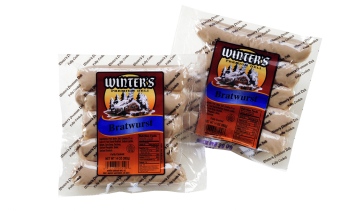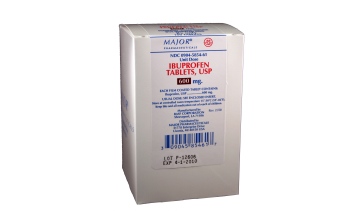
Supply to demand
By Del Williams
General Coding & Labeling American Label & Tag Inc. Print-on-demandFortunately for them, the so-called POD (Print-on-Demand) labeling process and technologies are finally living up to their early promise of delivering the flexibility they have sought for so long by offering cost-efficient means of generating labels—containing all the vital safety and other product information, along with attractive graphics—that can not only withstand all the processing and packaging line rigors and abuse, but will often actually exceed the legibility, durability, and visual impact of many conventional adhesive labels, with significant bottom-line results for the manufacturers.
In today’s ever-changing CPG (consumer packaged good) marketplace, it is often a challenge for manufacturers of packaged foods and other consumer products to know just how many pre-printed adhesive labels they must maintain on hand for any given brand or SKU (stock-keeping unit)—often resulting in costly, wasteful label overstocking.
Fortunately for them, the so-called POD (Print-on-Demand) labeling process and technologies are finally living up to their early promise of delivering the flexibility they have sought for so long by offering cost-efficient means of generating labels—containing all the vital safety and other product information, along with attractive graphics—that can not only withstand all the processing and packaging line rigors and abuse, but will often actually exceed the legibility, durability, and visual impact of many conventional adhesive labels, with significant bottom-line results for the manufacturers.
Although widely adopted in recent years in the book publishing industry circles, POD is only now starting to get real traction in the label printing industry, with more and more print shops making capital investment in the equipment.
For good reasons too.
The new-generation POD label presses are full-color, digital print systems offering greater flexibility than conventional presses in job set-up and changeover times, helping manufacturers in a growing number of industries to reduce lead-times and accommodate shorter print runs while improving inventory control and overall supply chain management, according to a growing list of happy clients of American Label & Tag, Inc., Cannon, Mich.-based manufacturer of custom labels, tags, decals and nameplates that now offers POD labeling services.
Crisp Look
“We recently turned to the POD labels for their crisp, clear graphics, rapid turnaround and reduced inventory costs,” says Greg Vanhazenbrouck, general manager of Winter Sausage, a family-owned, premium deli meats company based in Eastpointe, Mich.
“Even with rising commodity costs, POD labeling has held down our cost-per-label and lowered our total cost due to improved efficiencies,” he says, adding that the quality of POD labels supplied by American Label & Tag has even surpassed that of the traditionally-printed labels the company used before, while satisfying the requirements of variable data and other last-minute changes.
“We take great pride in our taste-tested German family recipes, but our pre-printed package labels just didn’t reflect the care we put into our product,” recalls Vanhazenbrouck. “And as the graphics wore out and legibility suffered in the field, the packages just started looking older and less attractive to the shoppers.”
Soon after receiving a call, American Label & Tag helped Winter Sausage test for label image quality, durability and color to match the browns and grays of the company’s fresh and smoked meat packages—prototyping a variety of different color schemes to arrive at the best color combination quickly and inexpensively, Vanhazenbrouck recounts. (See Pictures)
 “Not only do the new labels give us the crisp, brand image we wanted to achieve, but they’re also holding up in the field really well,” says Vanhazenbrouck.
“Not only do the new labels give us the crisp, brand image we wanted to achieve, but they’re also holding up in the field really well,” says Vanhazenbrouck.
“Their lasting eye appeal is bound to help our sales,” he says, while also praising the POD labeling for help Winter Sausage enhance its time-to-market and product development—encouraging the company to develop new products and to repackage existing product in new sizes or styles to meet consumer demand.
“Since the POD labels have sped up package design, we’re now able to launch new products about 25 per cent faster,” adds Vanhazenbrouck. “It’s really helping us develop new business.
“For instance, to get a new foot-long sausage on the shelf of an important chain retailer, recently we had to meet their deadline, complete with labeling and packaging,” he relates.
“The POD labels helped us do just that, and the product is selling really well now,” says Vanhazenbrouck, noting that POD labeling is especially useful in keeping production running in the event of label changes necessitated by changes in ingredients, suppliers or regulations.
“When we had to change label data, pre-printed labels typically held us up for a week or more while we waited for them to print and ship,” says Vanhazenbrouck. “Now we significantly expedite label changes with POD labeling to keep production on track and help secure our retail shelf-space.”
Short Wait
Vanhazenbrouck says that POD labels can typically be ordered from American Label & Tag—a leading, ISO 9000:2008-certified supplier of pressure-sensitive labels founded in 1998—with lead-times of a week or less, significantly reducing his company’s required label inventory.
“Now we carry half the label inventory and order small quantities as needed,” says Vanhazenbrouck. “Since our inventory handling is more efficient, we’re saving about US$70,000 a year in reduced labor, with these ongoing savings helping free up capital and improve our cash flow.
“Anybody doing labeling who doesn’t want their money tied up in inventory should seriously consider POD labeling,” he concludes.
For Haier America, New York City-based distributor of home appliances, high-definition TV sets and residential air-conditioners, turning to POD labeling helped the company gain operational efficiencies along with improved customer relationships, according to sales manager Tom Reister.
 “American Label & Tag introduced us to POD labeling, and it’s taken one of the headaches out of the production cycle,” adds Reister. “Whereas lead-times for pre-printed labels used to run a
“American Label & Tag introduced us to POD labeling, and it’s taken one of the headaches out of the production cycle,” adds Reister. “Whereas lead-times for pre-printed labels used to run a
month or more, POD has reduced label lead-times to a week or less.
“It has helped streamline production f low, reduced our label inventories, and allowed us to respond faster to customers’ needs—especially on rush jobs or when there’s last-minute changes.”
For Phoenix Dental, Inc., Fenton, Mich.-based dental-care products manufacturer, quick label turnaround was an essential pre-requisite for the company’s recent campaign to boost the sales and open up new markets for the company’s innovative Super Seal product—a potassium oxalate chemistry-based remedy for tooth sensitivity.
“Our Japanese market required the product immediately, and in order to ship it that same day we needed to have all lot labels completed,” recalls Phoenix Dental’s chief development manager Sherry Moffitt. “Traditional label printing would have caused an unacceptable delay of at least one to two weeks for us, and we couldn’t rush the job and risk compromising the quality of the labels.
“So American Label & Tag printed the labels digitally on-demand and actually hand-delivered them to us that afternoon,” extols Moffitt. “We were able to ship the same day and kept our promise to our key Japanese customers.
“Now the Japanese market is growing very nicely for us,” says Moffitt, adding that the American Label’s POD capabilities have considerably shortened the time between spotting new market needs and opportunities and getting the new product out there.
“Whenever we spot a market need, American Label & Tag can create, within a week, a fully-labeled, packaged prototype for us that we can actually put into prospective customers’ hands,” explains Moffitt. “It has definitely helped us close some deals, and will play an important part in the launching of our several new products soon.”
Other manufacturers, meanwhile, are making astute use of POD labeling to meet important seasonal deadlines.
“To include a new line of chocolate covered confections in the Christmas catalog, we really to had to expedite the label completion,” says Brian Jefferson, chairman of Sanders Candy, a 135-year-old Clinton Township, Mich.-based producer of fine chocolate, candy, and dessert toppings, and a division of Morley Brands, LLC.
“With digital POD, American Label & Tag completed the labels for our line within two weeks for catalog inclusion,” recalls Jefferson, adding that quick turnaround and short production runs made possible with POD labels also help Sanders Candy take advantage of niche market opportunities it would otherwise miss.
“We use POD to relabel product when we want to do a “blowout sale’ or limited-time offers for local or national retailers,” says Jefferson, “and American Label & Tag helps make this possible with custom short runs of 1,000 to 3,000 labels, with turnaround of just a few days.”
Founded in 1988 as a supplier of pressure-sensitive labels, American Label & Tag expanded into the tag market in the 1990s, and during the past decade has significantly boosted its digital printing capabilities—today doing all its own artwork, graphics, design and platemaking, while also supplying an extensive range of label printers, software, barcoding systems and accessories into the domestic and export markets.
Photos courtesy of American Label & Tag.
Advertisement

